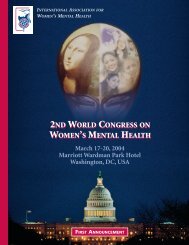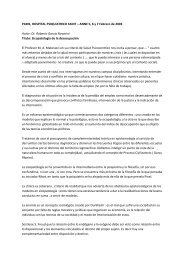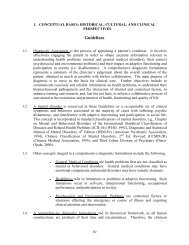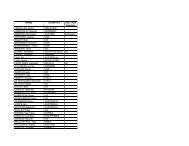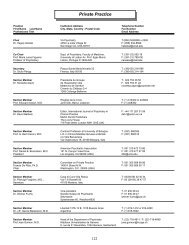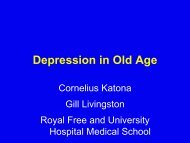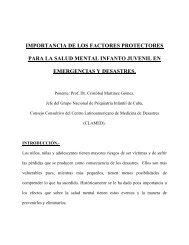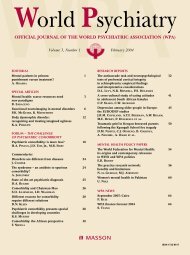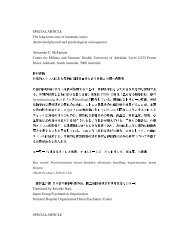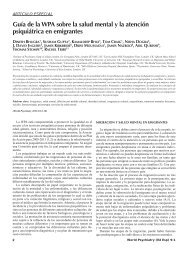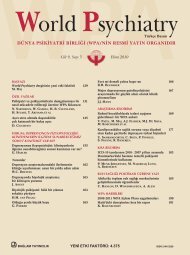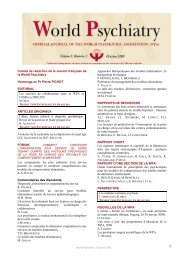ABSTRACTS - World Psychiatric Association
ABSTRACTS - World Psychiatric Association
ABSTRACTS - World Psychiatric Association
You also want an ePaper? Increase the reach of your titles
YUMPU automatically turns print PDFs into web optimized ePapers that Google loves.
and worse global functioning (as evaluated by the Global Assessment<br />
of Functioning, GAF), both at the admission and in the course of the<br />
last year. CGI improvement score was significantly higher in the<br />
clozapine treated group. The most serious side effects were neutropenia<br />
(6 cases), epileptic seizures (2), clonic jerks (4), pancreatitis (4),<br />
ileus (1). All these side effects disappeared completely in a few days,<br />
after withdrawal or dose reduction of clozapine. In conclusion, clozapine<br />
is very effective in the treatment of psychotic disorders. Its current<br />
underuse is not justified from a clinical point of view.<br />
PO1.33.<br />
EFFECTIVENESS OF COMPULSORY TREATMENT<br />
WITH ANTIPSYCHOTICS<br />
P.F.J. Schulte<br />
Mental Health Services North-Holland North, Heiloo,<br />
The Netherlands<br />
In 2008 the Dutch Society for Psychiatry presented a guideline for<br />
decision-making on compulsory hospitalization and treatment. As<br />
part of the preparation a systematic review was carried out to assess<br />
the effectiveness of compulsory treatment with antipsychotics, antidepressants<br />
and electroconvulsive therapy. A systematic search strategy<br />
in Medline revealed no randomized controlled trials and only one<br />
controlled trial. Two controlled trials were included after additional<br />
information by the authors. Hand search and inspection of the references<br />
added five controlled and two uncontrolled trials. We present<br />
here the controlled studies with antipsychotics.Three investigations<br />
found no difference in treatment outcome between compulsorily and<br />
voluntarily treated patients (the majority with psychosis and treated<br />
with antipsychotics). The fourth investigation compared involuntarily<br />
admitted patients (74.5% with schizophrenia or schizoaffective<br />
disorder) who accepted medication with those who were compulsorily<br />
treated with medication. The outcome was slightly better in the<br />
group with compulsory medication. Hoge et al (1990) found longer<br />
hospitalization and more seclusion and restraint in patients who<br />
refused medication after admission in comparison to non-refusing<br />
patients. In schizophrenic outpatients, a community treatment order<br />
(CTO, which includes in nearly all patients obligatory medication)<br />
leads to a decrease of number and duration of hospitalizations in the<br />
twelve months after start of the CTO in comparison to the twelve<br />
months before. A second investigation in psychotic outpatients with<br />
CTO found less hospitalizations in the group with depot antipsychotics<br />
in comparison to the group with oral antipsychotics. The<br />
Dutch guideline commission concludes that compulsory treatment<br />
with antipsychotics shows comparable effectiveness as voluntary<br />
treatment.<br />
PO1.34.<br />
AN AUDIT OF ANTIPSYCHOTIC MEDICATION<br />
PATHWAYS IN FIRST EPISODE PSYCHOSIS<br />
Y. Dundar, J. Underwood, S. Jefferies, Y. Denham, D. Vecchio<br />
Department of Psychiatry, North Devon District Hospital; North<br />
Devon Specialist Team for Early Psychosis, Devon, UK<br />
The National Institute for Health and Clinical Excellence (NICE)<br />
guidelines published in 2002 recommend for first-episode psychosis<br />
the prescription of atypical antipsychotics as first line at low dose as<br />
monotherapy, and to initiate clozapine in treatment-resistant<br />
patients. We aimed to compare current antipsychotic prescribing in<br />
early psychosis in North Devon with practice recommendations by<br />
NICE guidelines. We carried out a retrospective file audit on randomly<br />
selected young people (n=36) presenting with first-episode psychosis<br />
under the care of Specialist Team in Early Psychosis (STEP) in<br />
North Devon. Diagnoses were: psychotic episode (48.3%), druginduced<br />
psychosis (37.9%), schizophrenia (3.4%), schizoaffective<br />
disorder (3.4%), mood disorder (3.4%) and psychotic depression<br />
(3%). In 32 (89%) cases an antipsychotic medication was indicated.<br />
Prescribing antipsychotic monotherapy was consistent with NICE<br />
guidelines in all cases; however, clozapine was not initiated in any of<br />
the four cases where there was no improvement for 6-8 weeks with<br />
two different antipsychotics. Consistent with NICE guidelines: atypical<br />
antipsychotic were used as first medication (93.8%), the prescription<br />
of low-dose atypical antipsychotic as first medication (81.3%),<br />
and antipsychotic dose range within the British National Formulary<br />
standard range (83.6%). These findings suggest that there is some<br />
inconsistency in prescribing practice. Introducing a standardized<br />
form for recording initiation and changes in medication would be<br />
useful to improve consistency and clarity of recording of medication.<br />
In addition, well-staffed early intervention teams with dedicated consultant<br />
input, specialised training, and procedures for involving and<br />
educating users, cares and general practitioners are essential in<br />
improving practice in an area where the diagnosis is often uncertain.<br />
PO1.35.<br />
ATTITUDES TOWARDS MEDICATION IN BIPOLAR<br />
AND SCHIZOPHRENIC PATIENTS AT DISCHARGE<br />
FROM PSYCHIATRIC ACUTE INPATIENT UNIT<br />
J. Salva, M. Silvestre, J.L. Galan, J. Larumbe, A. Ugidos, I. Leon<br />
Hospital Universitari Son Dureta, Palma de Mallorca; Hospital<br />
Infanta Cristina, Badajoz; AstraZeneca Farmaceútica Spain;<br />
Hospital Psiquiatrico de Alava; Hospital Virgen Blanca, León;<br />
Mediclin-Quintiles, Madrid, Spain<br />
The purpose of this study was to assess the attitudes towards medication<br />
in bipolar and schizophrenic patients at discharge from a psychiatric<br />
acute inpatient unit, and to explore factors associated with this<br />
attitude. This was an observational, cross-sectional and multicenter<br />
study. Patients were recruited consecutively in 5 inpatient acute units<br />
in 5 states of Spain. Assessments were carried out in the 24-48 hours<br />
prior to discharge. The average and median on the Drug Attitude<br />
Inventory (DAI) was 16.0; 66.7% of the patients had a DAI>15. We<br />
found a statistically significant relationship between DAI>15 and the<br />
length of the assessed admission (p=0.01), the last admission<br />
(p=0.007) and the last acute episode (p=0.04); the number of years<br />
since the prior admission (p=0.04), the numer of years since the prior<br />
acute episode (p=0.01), and the total score on the Scale to Assess<br />
Unawareness of Mental Disorder (SUMD), used for assessment of<br />
insight (p=0.001). There was no significant relationship between<br />
DAI>15 and age, duration of illness, educational level, number of<br />
acute episodes in the previous 5 years, psychoeducational therapy,<br />
and CGI-S and CGI-C scores. We did not identify any variable with<br />
influence on the DAI on the logistic regression analysis.<br />
PO1.36.<br />
DURATION OF DRUG THERAPY IN PATIENTS<br />
WITH SCHIZOPHRENIA<br />
J. McCombs, S. Zolfaghari, D. Stafkey-Mailey, V. Ganapathy<br />
School of Pharmacy, University of Southern California, Los<br />
Angeles, CA, USA<br />
This study aimed to compare time to all-cause discontinuation<br />
(TTAD) across drug therapies for patients with schizophrenia. Three<br />
years of commercial health plan data were used to identify non-institutionalized<br />
patients with schizophrenia initiating treatment using<br />
162 <strong>World</strong> Psychiatry 8:S1 - February 2009



